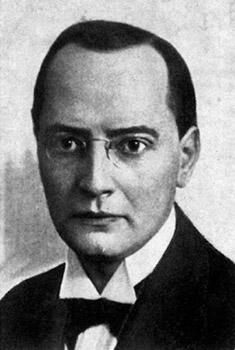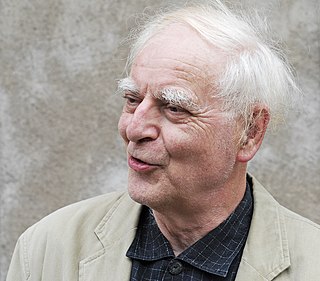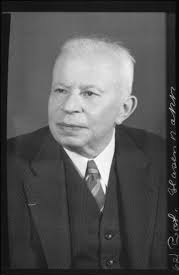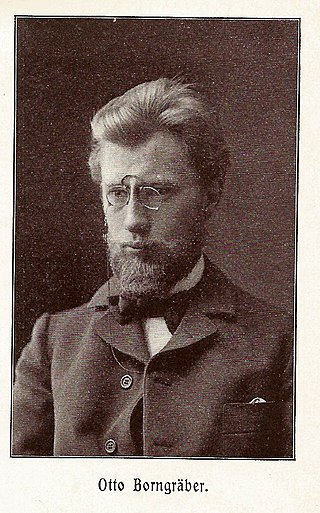
Sarah Kirsch was a German poet.

Walter Serner was a German-language writer and essayist. His manifesto Letzte Lockerung was an important text of Dadaism.

Otfried Höffe is a German philosopher and professor.

Adolf Muschg is a Swiss writer and professor of literature. Muschg was a member of the Gruppe Olten.

Max Bense was a German philosopher, writer, and publicist, known for his work in philosophy of science, logic, aesthetics, and semiotics. His thoughts combine natural sciences, art, and philosophy under a collective perspective and follow a definition of reality, which – under the term existential rationalism – is able to remove the separation between humanities and natural sciences.

Ingeborg Drewitz was a German writer and academic.
Edzard Schaper was a German author. Many of his works describe the persecution of Christians.

Kurt Flasch is a German philosopher, who works mainly as a historian of medieval thought and of late antiquity. Flasch was professor at the Ruhr University Bochum. He was / is a member of several German and international Academies. In 2000, he was awarded the Sigmund Freud Prize by the Deutsche Akademie für Sprache und Dichtung.

Volker Gerhardt is a German philosopher. He specializes in ethics, political philosophy, aesthetics, metaphysics and theology. His historical studies are centered on Plato, Kant and Nietzsche but have also dealt with Hegel, Marx, Jaspers, Voegelin, Hannah Arendt, Carl Schmitt and others.

Andreas Urs Sommer is a German philosopher of Swiss origin. He specializes in the history of philosophy and its theory, ethics, philosophy of religion, and Skepticism. His historical studies center on the philosophy of Enlightenment and Nietzsche, but they also deal with Kant, Max Weber, Pierre Bayle, Jonathan Edwards, and others.

Franz Manfred Wuketits was an Austrian biologist, university teacher and epistemologist. He wrote extensively on epistemology, the history and theory of biology, evolution theory, evolutionary ethics, evolutionary epistemology and sociobiology.
Eva Lang is a German economist. Before her retirement, she was full professor at Bundeswehr University Munich for economic policy in special consideration of political economy.

Otto Max Helmuth von Glasenapp was a German indologist and religious scholar who taught as a professor at the University of Konigsberg in East Prussia (1928–1944) and Tübingen (1946–1959).

Meinloh von Sevelingen was a 12th-century Minnesänger from Swabia and one of the earliest poets in the tradition.
Günter Herburger was a German writer. He was initially counted among the "New Realists" funded by Dieter Wellershoff, became the author of socialist, imaginative utopian worlds since the 1970s and took an outsider position in German-language contemporary literature. He was a writer of poems, children's books, radio plays and a member of the PEN Center Germany.

Peter Hamm was a German poet, author, journalist, editor, and literary critic. He wrote several documentaries, including ones about Ingeborg Bachmann and Peter Handke. He wrote for the German weekly newspapers Der Spiegel and Die Zeit, among others. From 1964 to 2002, Hamm worked as contributing editor for culture for the broadcaster Bayerischer Rundfunk. He was also a jury member of literary prizes, and critic for a regular literary club of the Swiss television company Schweizer Fernsehen.
Walther Killy was a German literary scholar who specialised in poetry, especially that of Friedrich Hölderlin and Georg Trakl. He taught at the Free University of Berlin, the Georg-August-Universität Göttingen, as founding rector of the University of Bremen, as visiting scholar at the University of California and Harvard University, and at the University of Bern. He became known as editor of literary encyclopedias, the Killy Literaturlexikon and the Deutsche Biographische Enzyklopädie.

Otto Borngräber was a German writer and playwright.
Albrecht Gotthold Neubert was a German translation scholar and lecturer in English language. Together with Gert Jäger and Otto Kade he was a notable member of the Leipzig School.

Klaus-Peter Hertzsch was a German Protestant theologian, poet, author and hymn writer.














